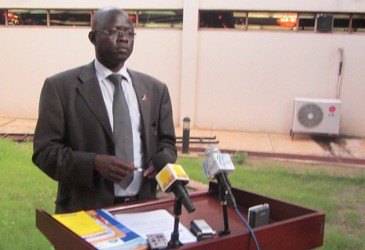
General Madut Biar Yel, South Sudan Minister of Telecommunication and Postal Services, takes questions from journalists on September 23,2011 in Juba. (photo by Ngor Garang-ST), a photo by Pan-African News Wire File Photos on Flickr.
UN peacekeepers cannot protect civilians in South Sudan: UN envoy
Tue May 28, 2013 2:42PM GMT
Due to lack of troops and aircraft, the United Nations peacekeepers in South Sudan are not able to protect civilians affected by fighting in the east of the country, head of the UN mission in South Sudan says.
Hilde Johnson said in a Monday statement that “We cannot sustain a presence with the logistical capacity that we have, with the problems we have with air transport and by road. So we cannot protect civilians in big, big, big numbers (in Pibor town in troubled state of Jonglei).”
Reports say that the UN mission in South Sudan (UNMISS) has over 6,500 troops in Jonglei which is the country’s largest state.
Clashes between the (South) Sudan People's Liberation Army (SPLA) and militants led by David Yau Yau in the eastern state have displaced tens of thousands of people.
According to aid agencies, nearly all of the 10,000 residents of Pibor town have fled their homes following clashes in the area.
On May 20, at least 24 people including 20 militants and four government troops were killed in clashes between soldiers and the militants in the town.
Meanwhile, South Sudanese soldiers ransacked stores of the United Nations in the town on May 10.
They also looted a hospital and premises of Doctors Without Borders (MSF) and flattened premises of the Italian humanitarian aid organization INTERSOS.
Following the assault, many international aid workers left Pibor over concerns of possible attacks.
In July 2011, South Sudan voted to break away from Sudan following a two-decade civil war that killed about two million people in the East African country. But the new oil-rich nation, which is one of the least-developed countries in the world, has had to confront ethnic tensions and rebellions of its own.
Yau Yau rebelled against the government in Juba after he was defeated in the elections of April 2010. However, he accepted amnesty in June 2011, a month before South Sudan gained independence.
No comments:
Post a Comment